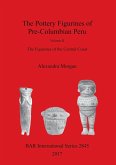Studies of social complexity increasingly recognize the role of maritime communities in the development of large sociopolitical systems. The Central Andes present an ideal region for understanding maritime aspects of ancient social complexity, due to one of the most productive sea biomasses in the world. In this study the author investigates Samanco, an ancient seaside town, and its contribution to urban transformations along the North-Central coast of Peru during the mid-1st millennium BCE. This book focusses on Samanco's primary occupation (circa 500-1 BC). The author consults a theoretical framework of performance and its influence on community organization as a framework for analyzing sociopolitical development. Two field seasons of intensive excavations at Samanco in 2012 and 2013 yielded a substantial dataset to analyze performance and maritime aspects of early urbanism in the Central Andes. This book provides an in-depth look at Samanco's archaeological record, supplanted with theoretical analysis of performance, common experiences, and community organization. The research reveals a thriving coastal town during a period of settlement nucleation, known as the Salinar phenomenon, which is not adequately understood in the ancient Andean world.
Hinweis: Dieser Artikel kann nur an eine deutsche Lieferadresse ausgeliefert werden.
Hinweis: Dieser Artikel kann nur an eine deutsche Lieferadresse ausgeliefert werden.








